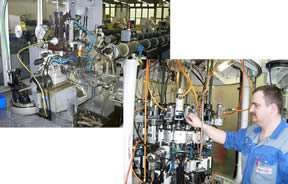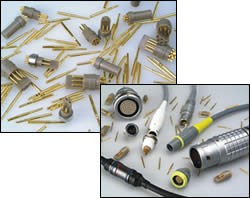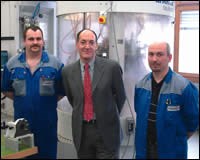Pinning Down Production Clinches Significant Savings
Rotary transfer machines have allowed this shop to capitalize on single-operation capabilities to increase production, cut leadtimes and save manufacturing costs.
A product of quality has a certain feel about it, as is verified by the delicate touch of the assemblers who put together dozens of miniature pins into electrical plugs and sockets for Lemo, a Swiss manufacturer of about 75,000 different types of high-class unipole and multipole electrical connectors. Lemo’s connectors are sold worldwide for applications as diverse as medical, aerospace, nuclear, satellite and defense, as well as the oil industry and Formula One.
Lemo has four production operations in Switzerland, where it is headquartered. Recent investment in the company’s plant at Redel, high in the hills of Sainte-Croix, has transformed the production processes for connector pins—sales of which have grown by about 40 percent since 1998.
Featured Content
Lemo has moved its plug and socket pins from more traditional methods involving multiple operations on sliding headstock automatics and milling machines. The company has now implemented three of the latest high-production, single-operation rotary transfer machines from Mikron Machining Technology (Lugana, Switzerland) for the female pins. Because of the effectiveness of this change, the company is now extending its newly gained production methods, putting on order for this year three more Mikron machines to produce the mating male pins.
The new method of producing the more complex bronze female connectors has raised comments from the assembly team. Members of the team say that they can immediately feel the difference between the new and previous process methods in the finer quality of finish gained from the rotary transfer machines.
Abraham Ratano, a director responsible for the connector operations and spear heading the progressive installation of the Mikron Multistar CX-24 rotary transfer machines, has a much stronger reaction to the new methods: “It has enabled us to cut leadtimes for, say, a batch of 100,000 pins, from between 6 to 8 weeks to a ‘made-to-order’ philosophy taking only 10 days. Not only has this helped to eliminate expensive stock piles at our plants and distributors, but it has also slashed the cost of manufacture by a factor of two-and-a-half times,” he says.
The Redel plant produces three pin sizes of 1.2 mm, 1.5 mm and 2.2 mm diameter in varying lengths of between 12 mm and 36 mm. Total, the company machined about 19.5 million male and equivalent female pins in 2004, which demonstrates the potential of the return on investment generated by the method change.
However, according to Mr. Ratano, further savings have been generated by the Multistars, which, depending on the part, have been able to deliver as many as 240 parts per minute. While Redel’s female connector pins are now produced nine times faster than before in a single cycle, ensuring that all geometric relationships of features are maintained at a rate of 40 per minute, the new method of manufacture has also enabled a redesign to be carried out.
The redesign involves the open end of these miniature pins and the incorporation of a special lead-in blended radius for the mating male pin. Also new is a bend in the wall of the pin that, in conjunction with milled slots, forms a “spring” bayonet type of retention of the male pin when it is inserted. Now, four previous individual operations of turning and three milling cycles have been combined into a single cycle ready for plating. The process integrity is so consistent that Redel is recording a Cpk of 1.67 at an overall production efficiency of more than 85 percent.
Female pin production has become so successful that Redel progressed to quickly order the three new Mikron Multistars, but this time Multistar LX-24 machines, because they are more suited to a single type of part that only requires machining of features on the center line of the workpiece.
According to Mr. Ratano, the decision to change to Mikron could have been high risk because of the added complexity of the redesign, and it took about 6 months of internal discussions about the process to define what was required. Three months of intensive development with Mikron then followed because of the complexity of the milling, drilling, turning and process control that was critical to the operation. Then, 12 months were needed for the first machine to be built and finally commissioned. Buying the Mikron machines was not the only solution. Redel also looked at CNC sliding head machines to replace its mechanical cam machines, but they could not match the cycle times. Multi-spindle automatics were also considered unsuitable because of the lack of stability in producing the 30 to 1 length-to-diameter ratio that is required on some components.
The company realized the significance of developing a “smoother” fit to reflect the high-quality reputation of its connectors. They are often connected and disconnected in difficult working environments, such as complete or partial darkness or in extremely fast-paced situations such as the race track. A 50-mm diameter connector can have up to 100 pins, and each has to make a first-time secure and positive junction. When this happens 100 or so times a day, in places such as television studios and hospitals, the reasoning behind Redel’s concern is fully
understandable.
To develop the smooth and positive locking of the male-to-female connection, the female pin was redesigned with a special blended lead radius. As a result, the company was able to reduce by half the force required to make a connection. This standard is checked entirely as part of the Mikron machining cycle. The tolerance applied to the force to engage must be between 0.15 Nm and 0.4 Nm and, when checked during production, tends to be maintained around 0.22 Nm. It has registered a Cpk of 4 (a quarter of the designated tolerance).
In order to ensure positive locking of the connectors, a bayonet-type fitting was developed at the end of the female tube. This fitting is created by milling two 0.2-mm wide parallel slots up part of the length of the tube and a third 0.2-mm slot at a 60-degree angle across the top. Then, through a controlled punching operation during the machining cycle, thin-walled material at the lip is plastically deformed to create the locking tag.
The Multistar CX-24 machine is designed to accommodate larger batches of part families containing complex components that require fast change-over. It is constructed around a central column and housing to support the 24-station rotary table, which carries the location collets with separate, tailored-to-suit-the-cycle linear cams to provide individual working strokes of the machining spindles. Spindles can be mounted at any angle, including off-center machining positions, when they are set on adjustable workstations. Spindle speeds are also adjustable, between 500 and 24,000 rpm. Although the machine has 24 stations, the number of collets can be doubled to provide 48 machining positions, and turnover stations can be included for producing operations at both ends of the component in a single, highly productive cycle.
At Redel, the machining cycle for female pins uses 24 stations of the machine. Initially, the bronze material is supplied in coils to an outside diameter tolerance of 0.025 mm, straightened and cropped to length at a rate of 300 per minute. Each pin blank has to be within a cylindricity tolerance of 0.05 mm prior to machining.
Pins are then bowl fed individually into the CX-24 machines where the solid cable end of the pin is produced first. It is then turned over in cycle and the machined diameter is used as a location to produce the female end and bayonet fitting. The complete process includes overturning of the outside diameter, center drilling and drilling of a 1.1-mm diameter hole to a tolerance of 0.02 mm by 3 mm deep. A cross hole of 0.4 mm diameter is also drilled, and a milled form is produced. Finally, the holes are reamed for deburring.
The part is then turned over automatically to relocate on the turned diameter in a stepped collet, and it is faced to length. The outside diameter is overturned to 1.3-mm diameter with a 0.3-mm tolerance, and the end is center drilled, drilled and reamed to 0.76 mm by 6.5 mm deep with a tolerance of 0.2 mm. Two 0.2-mm-wide slots are then milled on each side to break into the main drilled hole, and the bore is finally reamed to size, removing any milling or drilling burrs.
An angle slot is then milled across the end to a width of 0.2 mm at a 60-degree angle to the center line to create the spring retainer effect. The resulting slot is deburred. A 0.69-mm hole is then cross drilled to a tolerance of 0.2 mm through the part, followed by a support being inserted into the main 0.76-mm bore. A punch is then impacted against the milled portion of the bayonet wall, 0.25-mm thick, to create the retaining lip.
The main bore is then cleaned and a piezo-electric sensor is finally engaged into the bore to measure the extraction force required before the part is unloaded. All three Multistar CX-24 machines include broken tool sensing based on a hydraphone system, real-time monitoring of production, ultra-fine 2-micron filtration of coolant and temperature control. A fire extinguisher system is fitted to each machine for extended unmanned running.
All three machines are run over two shifts and are unmanned at night. Four people, including a supervisor and setter, take charge of production. According to Christopher Caretti, who is responsible for the process, “The average time lost to setting the machine is around 2 hours each day.” In 2004, records show the company performed 146 change-overs in 225 working days and, depending on the complexity of the setup, these operations could take between 1.5 and 8 hours.
Christopher Hazard, the machine setter, talks about the consistency of the process from all three machines: “We used to measure parts every hour in the inspection room using a video-based, non-contact measuring machine. This has now been extended to one measuring cycle every 4 hours, and our SPC records confirm how consistent the process has proven to be.”
Indeed, with the recent move to bring in three of the LX-24 Multistar machines to produce the less complex male connector pins, Redel expects to gain even more significant savings. While the female pins are produced at some 40 parts per minute, the male pins will be produced about 50 percent faster. The new processes have proven to bring the feel of quality that the parent company has requested.
RELATED CONTENT
-
Precision Machining Technology Moving Shops Forward
New equipment and software continue to be developed to support the needs of production machine shops like yours. Here’s a sample of technology now on the market that can help you grow your operation and become more efficient.
-
Beyond One and Done
Rotary transfer machining is one proven solution for high volume machining. Today’s CNC rotary transfer machines provide more than “set it and forget it” production; they are flexible enough for high mix and low volume production demands.
-
Rotary Transfer Versus Swiss for Small Precision Parts
A little creativity goes a long way in meeting the challenges that this high-production application presents.









